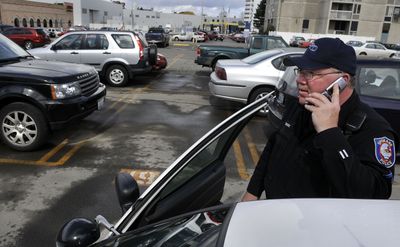Crime reflects economy
Sharp increase in thievery blamed on pinch, job loss

Inland Northwest police say they’re seeing an increase in property crimes that exceeds anything witnessed in the last 10 years.
“The reasons for the upticks have little to do with a lack of police action,” said Richard Rosenfeld, professor of criminology at the University of Missouri-St. Louis and an expert on crime trends. “It’s a result of the recession.”
Thieves are targeting the usual wallets and purses, as well as other goods that are then sold in an underground market to people looking for a cheap deal, he said. “Everything has a price during an economic downturn,” Rosenfeld said.
Spokane police have seen as many as 130 car break-ins during one week, and often as many as 100 per week during the first two months in 2009, said Thomas Michaud, a crime analyst with the Spokane Police Department. That’s more than double the number two years ago, he said.
Shoplifting jumped 78.9 percent in Kootenai County last year compared with 2007, and robberies jumped 80 percent, said Kootenai County sheriff’s Capt. Ben Wolfinger.
“Property crimes go up during times like this,” Rosenfeld said. “When the economy turns down, it imposes additional strain on families, and more people turn to crime.”
In northeast Spokane, car thefts were higher for seven of the first 12 weeks of this year when compared with 2008, Michaud said.
While burglaries and other thefts also tend to go up during tough times, the increase in those crimes has not been dramatically higher locally. Rosenfeld said demand for stolen goods tends to go up during economic downturns, showing up in underground markets, because the items are often cheaper.
“Thieves steal the items, then go to the lower-income neighborhoods to sell the goods,” he said. “And they are selling these things to people who are not necessarily criminals, but rather people who are looking for a good deal – this can include purses, pens and pencils, and even baby formula.”
Underground markets exist in Spokane, Michaud said. But it’s more common for thieves to use Craigslist than to sell goods out of the trunk of a car.
Domestic violence also goes up during a recession, Rosenfeld said. Job loss causes additional stress on someone who may be prone to violence, and puts that person in more frequent contact with his or her family, he said. While crime analysis in the Inland Northwest did not reveal an uptick in domestic violence here, the YWCA Alternatives to Domestic Violence program, which helps victims, has been busier in recent months than in the last 10 years, according to the progam’s director. “During the last several months, we’ve had increases in the demand for all our services,” said director Patty Wheeler. “Our shelter is full. We’ve had to put people into motels.” The waiting list for counseling is three weeks instead of the usual one, she added.
“Money isn’t necessarily the cause of domestic violence, but people lack the means to get out of it,” Wheeler said. “People need to rely more on social services to help them get out of a situation.”